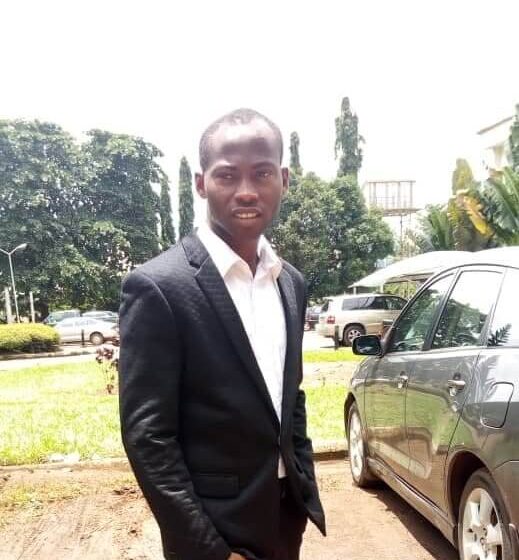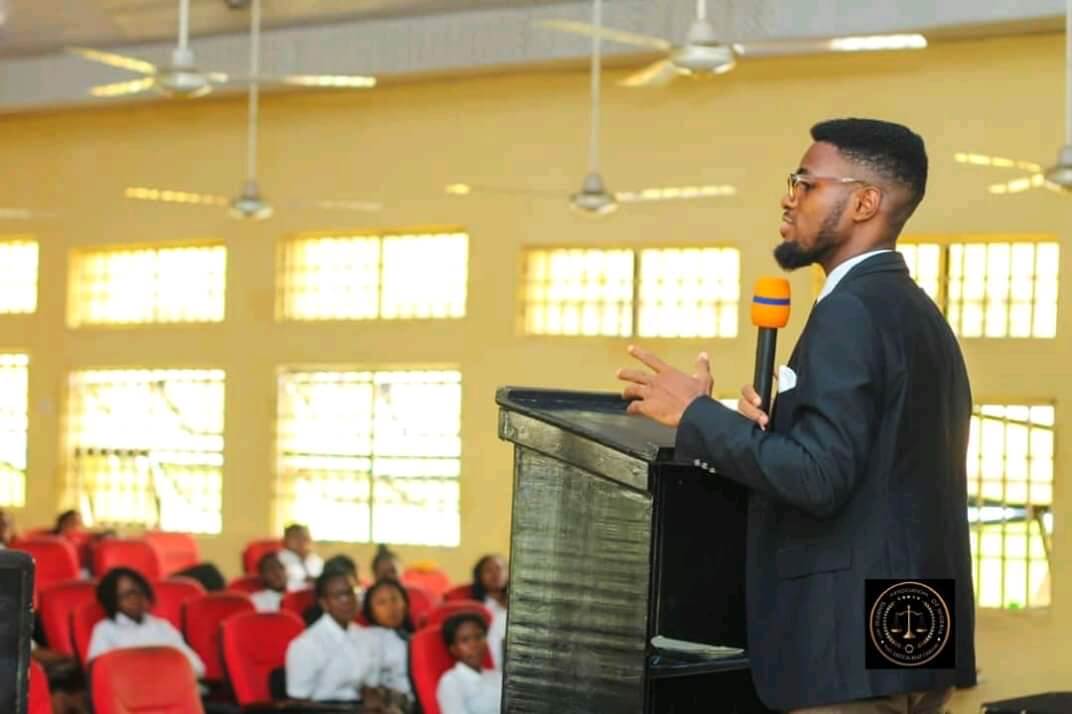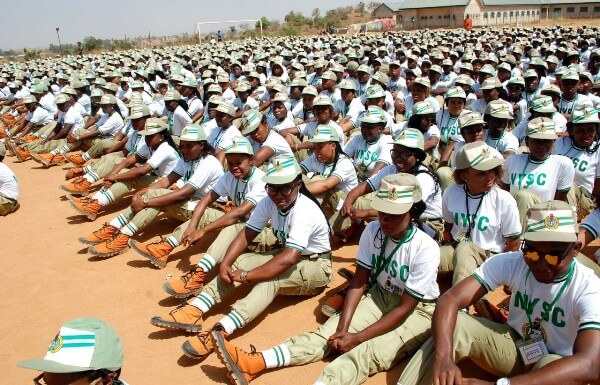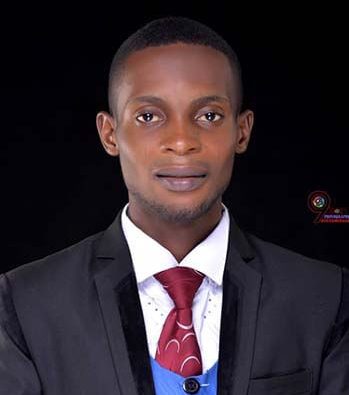Not to be pitied: Meet Maxwell, visually impaired Nigerian who graduated with 4.64 CGPA

When Opara Maxwell dropped out of university due to bad sight in 2013, it seemed an end of road for the young Nigerian with a promising future.
However, the native of Abom Mbaise Local Government Area of Imo State, would simply not throw in the trowel.
His tenacity to forge ahead despite his deteriorating sight made him sat for another set of examination just to gain admission into the university again.
Today, Maxwell did not only graduate with 4.64 Cumulative Grade Points Average (CGPA) but also emerged the best graduating student in his faculty at the University of Nigeria, Nsukka (UNN) in Enugu State.
In this chat with CRISPNG, Maxwell talks about the secret of his academic success, challenges facing those with disabilities in Nigeria and the need for inclusive society for the physically challenged in the country.
Tell us about yourself
My name is Opara Maxwell Mark. 1’m 26. I graduated from Social Studies Education unit, Department of Social Studies Education, Faculty of Education, UNN. I hail from Imo State, Abom Mbaise Local Government, specifically.
We learnt you had some hitches with your admission when you lost your sight. Tell us what happened.
I was once a student of the Federal University of Technology, Owerri (FUTO) in 2010. I was admitted to study Microbiology for five years but in 2012-2013 session which was to be my third year, I noticed that my lens couldn’t see the board clearly anymore. So, I sought medical treatment in relation to the ones I was receiving at the school clinic then.
It was in 2013 that I was declared a disabled student and that was because my eyes were not responding to treatment and the doctor told me it was glaucoma.
During this period, I withdrew from school twice, trying to seek medical attention but the doctors there told me to get a low visual aid which I declined because I knew fully that it would weaken the veins of my eyes. I also refused using a telescope because I could not visualize all the alphabets on paper given to me to read. More so, it was very expensive—about N300,000 to get one. Sensing I would not buy into their suggestion, the doctor advised me to go and seek for other alternative ways to study as a visually impaired.
So, I enrolled into one of the schools for the physically challenged located in Umuiaha, Abia State in 2014, where I acquired typing skills. By November that same year, I came down to Lagos, Nigeria’s economic hub, to join a school for the blind where I enrolled for my West African Examination Council (WAEC) and Joint Admissions and Matriculation Board (JAMB). I was basically starting all over again because I wanted to switch from being a science student to an art student.
After this, I applied for social works at the University of Nigeria, Nsukka (UNN) in Enugu State, but unfortunately, I was given social studies education and that was how I became a student of the institution. Gaining admission into UNN didn’t give me any challenge–contrary my expectations.
You recently made first class and emerged the best graduating student in your faculty. How did you achieve this feat?
Yeah. Success, they say, is not accidental. I was not guided by my fears and disability but by my instincts. I made a decision the very moment I dropped out of school that if I am given the opportunity to see the four walls of the university again, I would give my best. Luckily for me, I was admitted to study social studies education at UNN.
One thing I knew that worked for me was selecting good friends who were willing and ready to work with me. As at then, I was still seeing partially and that gave me an edge. Truly, we collaboratively learnt every topic treated by our lecturers which gave me access to the hidden aspects of whatever the lecturer must have taught us. In areas that I did not understand, I discuss with my friends to get their own knowledge aggregated to mine and all I needed do was to go back home, read continuously those topics that I found difficult.
The truth there remains the fact that I knew the feat was not achieved on a platter of gold. I worked for it—sacrificed my sleeps at nights reading and sometimes Church on Sundays if I am having an exam the following day or the next—just because I wanted to have As in all the courses I registered for.
So, I used the principle of collaborative or team work and that what was did the magic. Nothing else. The challenges I went through before attaining this feat were enormous. Sometimes I am faced with calculations in some courses and sometimes diagrams but just like I told you, I had friends who were willing and ready to sacrifice their time to explain those concepts to me even when I don’t understand it.
Whenever I go into an exam hall and find out I cannot answer certain questions because I do not have someone to write for me in that area, all I have to do is chose other questions to answer.
Also, whenever we are being taught in the class and I am unable to see diagrams being drawn on the board, all I have to do is give them my rapt attention to ensure that whatsoever they said, I captured it and whenever I am out of the classroom setting, I would approach one or two of my friends and ask them for more clarification—which I always get.
I must confess that I was blessed with friends who believed in me, and ready to sacrifice their time. All these helped me a lot.
I made a decision the very moment I dropped out of school that if I am given the opportunity to see the four walls of the university again, I would give my best.
Many physically challenged believe taking to the streets to beg for alms is the last hope for them. What do you have to tell such people?
The African mentality has always been that begging is the last option for a blind person or other physically challenged. I don’t think so, thank God for education. It has brought about light into the dark world we currently live in. Ideally, begging should not be seen as the only means of survival for the blind, but that is if those in those category learn to go to school.
This will go a long way in helping them to accomplish their dreams. I think blindness is not a reason to beg, but sometimes, the environment these individuals find themselves pushes them into doing that. When families disregard and treat them like outcasts, they have little or no option in this case but to go into the streets just to survive. I don’t blame them.
I think blindness is not a reason to beg, but sometimes, the environment these individuals find themselves pushes them into doing that.
But if they are privileged to see the four walls of school, they should endeavor to learn and this is exactly where our governments should come in. Many parents out there do not know there are schools for the blind or the disabled.
If government can make these schools free and take care of these ones bearing in mind that they are citizens of Nigeria, then I believe that they would get the requisite knowledge about a better life and they would be productive and be a functional member of the society.
I also believe that the media have a lot to do for us. They should be able to sensitise and educate parents and guardians about disabilities, make them realise that disability is never the end of road for any child.
What challenges do you think people with disabilities face in the society and how do you think such can be addressed?
The challenges we the disabled go through in the society are numerous. And the few I would cite here does not mean others don’t exist. Obviously, one major challenge we go through has always been discrimination. People sometimes do not believe we have the capacity to do anything.
They believe we are not worth living and should be relegated to the background. They believe we should be assisted at all times and be sympathized with. But this is not supposed to be the norm. Sometimes, we are being stigmatized when we are meant to live with others in a particular setting. Take school setting for instance, we have schools where visually impaired students cannot study with their counterparts in the same classroom. Rather, we are being pushed elsewhere to stay because some of these teachers or individuals within the society feel that disability is contagious or spreads faster than any communicable disease.
This is not true. Sometimes, we are been isolated and this is worst than being disabled. When you are isolated, you feel lonely and think negatively and the next thing you see them do is to commit suicide. That is just because the society in which they find themselves does not think they are worth living nor give them the required support.
These are the major challenges the disabled ones are facing within the society. Another of such is that when they get into schools or a new place, they find it difficult to associate with others and integrate themselves into the wider society because nobody wants to associate with them. This is because they don’t see anything go about them.
These make them feel dejected and even irritating to themselves at times. What I feel the government should do for me and other disabled ones is to initiate bills to foster inclusiveness in the society. The government should try and integrate us deeply into the various sectors of the society—economic, socio-cultural and political.
Let the disabled ones have their say in all aspect of government. The media also have a lot to do in this regard. They should provide disabled ones with platforms where they can express themselves to the world. With such opportunity, they can show the society that disability is not the end of the world and also to let them know its not a communicable disease which is mostly accidental and not bargained for.
I also want the religious bodies– churches and mosques– to help some erroneous beliefs that being blind or physically challenged is as a result of sins committed by the individiduals or their families. With all these in place, Nigeria will be a better place for everyone—including the disabled.
What are your words of encouragement to Nigerian youths generally?
My message to Nigerian youths is that we should believe in our future. We should believe in the future of Nigeria and in our leaders, bearing in mind that one day the baton will be handed over us to bring about the change we have been yarning for, for years. Let us collectively work for the betterment of this nation, let us harness our potential and see this great country Nigeria gets to the peak.
Nigeria is great, all we need to do is to tap into its greatness and see how we can be of great help to this great nation. If only we can become productive and functional, then the country will be a great place for us. Let us engage in productive activities while shunning immorality, corruption and fraudulent activities, drugs and trafficking.




